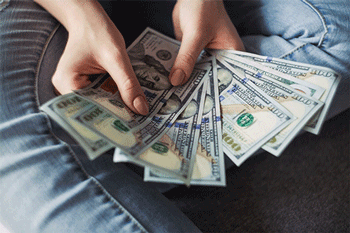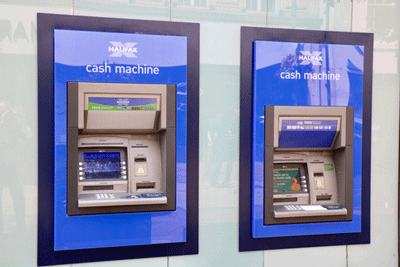- |
- Business
- Compare Exchange Rates
- |
- |
- Reviews
- |
- Help
- |
- Contact Us
- |
- Blogs
- |
- Currency Converter


With almost everything around being digital, people have slowly forgotten the importance of cash. However, this is not the case for all countries. Some nations are still actively using hard cash for their day-to-day transactions, and it would take a few years for them to shift from this.
And why should you care about this?
Because the country you are planning to travel to might be cash-dependent, directly affecting your travel plans.
Don't worry; the lack of e-transactions should not mean you will deprive yourself of visiting your dream destination. Here is a compilation of tips for travelling in cash-dependent countries like a pro.

It is not just about carrying cash, but you need to ensure you are not losing or wasting any money as well. The following tips will help you prevent all possible issues that you might otherwise encounter while travelling to a cash-dependent country.
1. Know Where You Would Require Cash
Just because the country predominantly uses cash doesn't mean every payment you make needs to be offline. For instance, you can book flight tickets and a standard hotel to stay online (in most countries).
Check your itinerary to see instances where you would have to pay in cash, such as local markets, experiences, food joints etc. Make a list of such instances and calculate an estimated amount that you need to carry.
2. Learn Which Currencies Are Accepted
Many countries accept foreign currencies readily for transactions. So, for example, you can use GBP in some territories other than Britain too.
So before you go, check which popular currencies you can carry or exchange GPB for when in urgent need. This will also help you get a better exchange deal, avoiding the fluctuating nature of many currencies.
3. Try to Keep Local Currency
Even though a country might accept foreign currencies, there will be instances where a local would refuse to take any. This can be due to lack of knowledge or just local stigma. However, it will surely become a hurdle to your smooth travelling experience.
Simply keep some amount in your destination's legal tender to avoid such nuances.
4. Carry What You Will Need for the Day
Even though you bring a hefty amount with you to the country, it doesn't mean you would have to carry all of it all the time.
Instead, only carry as much you would need to see, eat, buy and travel for that particular day. This way, even if your money gets stolen, you will have some cash waiting for you at your hotel.
5. Keep a Variety of Money
You do not make every type of payment with just 10 pound notes, and this logic doesn't change or other countries as well. Keeping a variety of notes and coins will ensure you are making quick payments and haggling to your heart's content.
Buy a coffee for 3 Euros and then spend 100s to purchase your ideal wine.
6. Keep Hard Currency with You
There are some currencies that you can exchange anywhere, such as Euros, Dollars and Pounds.
If for some reason, you lose your local currency or exhaust the amount you had, you can go to any bureau de change to exchange them readily.
A quick tip: You should always keep some amount in a different currency to stop yourself from over-spending. Even though the currency will get easily exchanged, it would still be a hassle to visit a bureau de change unless it is necessary.
7. Carry a Travel Size Safe
It's not necessary that every hotel you stay in would provide you with top-notch security. Hence, one of the best tips to travelling in cash-dependent countries that all pro travellers live by is carrying a small safe.
Keep all your extra money inside that safe so that you can travel the beautiful country without worrying about potential theft.
8. Where To Keep/Hide Your Money
Another great way of ensuring that you do not lose your money to a burglar is to hide it in different places. No one location has all your money, so even if one finds your stash, they won't be able to get everything.
The Broke Backpacker provides a comprehensive list of unique places to hide your money so that the thief that enters your room thinks you are broke.
9. Carry a Dummy Wallet
Conduct research about the location you are planning to visit. If you see that the area has a high crime rate, carrying a dummy wallet would be a wise decision.
Only keep a minimal amount in it and hand it over should someone threaten to harm you for money. This way, you will save yourself from physical assault without losing your original wallet containing all your belongings.
10. Avoid Giving Money to Beggars
Not every individual asking for help on foreign streets is actually in need. Since you cannot differentiate between professional and genuine beggars, refrain from spending any amount on helping them.
Instead, plan some volunteering activities and partake in donating funds to the local charities to make a substantial change.
11. Dress Up Like Locals
Understandably, you want to dress your best during your international trip. However, your flashy clothes will garner unwanted attention from thieves, pickpockets and other criminals.
Instead, dress like the locals to blend in and avoid being the target of such dangerous individuals.
12. Stash Your Money Safely
Just like hiding your money in different places in your hotel room, you can keep your day's stash in different parts of your body as well.
Use underclothing storage to hide your money and other valuable belongings. However, do not keep all your money there, as that would make every payment a tedious job. This would also mean you are exposing your secret stash to the robbers.
13. Choose Currency Exchange Wisely
Just like carrying your currency in a safe, you must purchase the money wisely. Waiting until you reach your destination to exchange currency might lead to unreasonable exchange rates and hefty processing charges.
However, if you choose a bank or offline bureau de change, you will not make much difference. So instead, select a reliable online currency exchange agency like The Currency Club, offering high exchange rates without any additional hidden fees.
14. Scavenge For Probable Discounts
There are many locations where merchants need to pay an amount as commission to the credit card companies.
Especially if you visit anywhere in Europe, you will find local businesses offering you discounts just because you are paying in cash. In case the merchant does not tell you about this offer, do not shy away and ask if there is a probability of getting one.
15. Know How to Exchange Money Abroad
There is an excellent possibility that you will exhaust the money you have brought before your trip ends. This usually happens because the local prices and fares differ greatly from what we get to know on the internet.
Hence, it is crucial that you know multiple ways of exchanging money in the areas you plan to travel. This may include currency exchanges, banks, ATMs, etc.
16. Always Exchange in Lump Sum
Unlike us, most currency exchange institutions ask for a substantial processing fee when you avail their assistance. Thus, it is wise to convert a large amount at once to avoid paying it multiple times.
Note that since you are converting a lot at once, you will most likely become the target of most professional robbers. Hence ensure that you hide the money well before leaving the currency exchange's building.
17. Exchange Money in Touristy Locations
Foreign currency exchanges will hardly offer you exchange rates as profitable as The Currency Club. However, you can bag a better deal by selecting the agency wisely.
Locations with many tourists tend to have more number of currency exchange institutions, making the area extremely competitive. Hence, the companies there tend to offer better deals to their clients compared to places with lesser tourists.
However, converting money at your travel destination should be your last resort. This is because a location bustling with tourists is also the hub of most crimes. As a result, your freshly converted money would be at risk of theft, and your life can also be at stake in some cases.
So, convert all the money you require before leaving for your trip to avoid such nuances.
18. Favour On-Body Storage
If you are always on the go and never stay in a place for too long, it is best to simply favour on-body storage. This is one of those tips for travelling in cash-dependent countries that campers should always live by.
One can steal your bag while you are sleeping in your camp. But that will not leave you penniless, stranded in an unknown country as all your money is in different compartments on your body.
19. Carry an Anti-Theft Bag
If you are someone who cannot bother himself\herself with too many little "money hiding" details, get yourself an anti-theft bag.
These are made up of sturdy materials that one cannot easily cut through. Moreover, it has numerous hidden compartments that you can conveniently access without garnering attention from unscrupulous individuals.
20. Organise Your Wallet
A thick wallet will undoubtedly become the target of pickpockets compared to a seemingly thin one. So, organise your wallet and only bring along the contents required to have a hassle-free trip.
For instance, your library card or bills from your previous purchases are of no use in another country.
21. Learn the Local Money Culture
Simply appearing like a local is not enough. You also need to use your money like a local. So, before you step foot in your destination, learn the local currency lingo and payment practices of that place.
This way, you will know where you can haggle and what sort of note and coin combinations you can use to pay. There can also be instances where a certain note or coin is in the process of discontinuation. Again, having prior knowledge of that would help you stash only the acceptable bills and coinage.
22. Check the Availability of ATMs
When in a different city, ATMs are your best friend.
You might run out of money at any moment. Having a sound idea of the ATM vestibules in that locality will ensure you are not short of money at any given point.
23. Avoid Traveller's Cheques
Most financial institutions promote traveller's cheques as a convenient way of making payments in cash-dependent countries. However, that is not the case in practical scenarios.
Often restaurants, retail shops etc., charge inflated exchange rates on these kinds of payments. This is also why they would encourage you to use cheques instead of local currency.
Do not fall for such offers and try only to use cash to purchase, pay and book. This will also ensure that you pay the exact amount instead of giving a cheque of higher value for a cheaper item.
24. Inform Your Bank About Your Trip
Banks tend to lock cards when they detect a sudden increase in their usage, especially if it is far away from the registered location. Since you will have to be heavily dependent on ATMs, you should inform your bank about your trip in advance.
This is not just one of the tips for travelling in cash-dependent countries; you need to do this for every long trip you take.
25. Know All About Cash Limits
Just because your destination is heavily cash-dependent doesn't mean you will get permission to travel with a huge amount. Hence, knowing the amount you can carry while leaving the UK and entering your destination is necessary.
For instance, you cannot carry 10,000 pounds or more in cash between Great Britain and other countries. You need to declare the amount to the UK customs; else, a Border Force officer will seize all the cash you carry.
If you want to know more about this, check GOV.UK.
26. Know Whom to Tell if Cash is Stolen
Taking all the possible precautions doesn't mean that your money cannot get stolen. Unprecedented situations may occur, and you should be prepared for the worst.
Hence while you are at it, research the regulatory institutions present in that country. Take a note of all the necessary steps you need to take when reporting theft and what kind of assistance you can expect from its government.
Travelling to countries that majorly deal in cash might seem intimidating. However, most travel enthusiasts do not shy away from this challenge.
Although it's a bit bothersome, you can have a great time without constantly worrying about your money in such locations. It's just you need to be well prepared for all possible situations.
Use the list mentioned above of tips for travelling in cash-dependent countries and have the time of your life in your dream destination.
And if you need any help converting money, The Currency Club is always here to assist you with that!

We have made every effort to ensure that the information published here is correct and accurate, however you should check and confirm the latest exchange rates with The Currency Club directly prior to making a decision. The information published is general and does not consider your personal objectives, financial situation or particular needs. Full disclaimer available


A page for us to share with you our thoughts on everything to do with with foreign exchange and much more. From new product launches and widgets to political announcements, market insights and even where to head on your next holiday look no further, you'll find it all here.


March 2022
There can be multiple reasons for which you would need to send money abroad. Be it to pay for an item, to buy a property or just transfer money to a loved one.
Read More

October 2020
As a new year begins and the January blues sets in, many will return to their desks attempting to tackle their backlog of emails but at the same time distracted by which destination they should escape to next..
Read More

December 2020
According to Mintel research, 43% of holidaymakers used a debit or credit card last year and this seems to be on the rise with the 30-45 year age group.
Read More